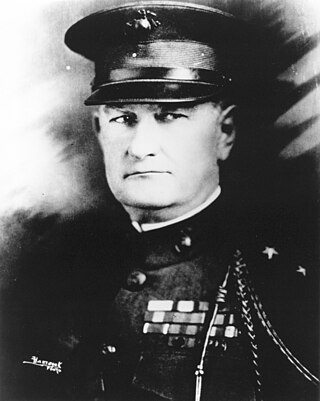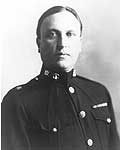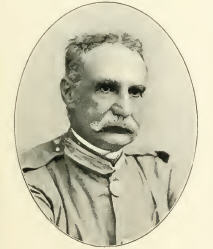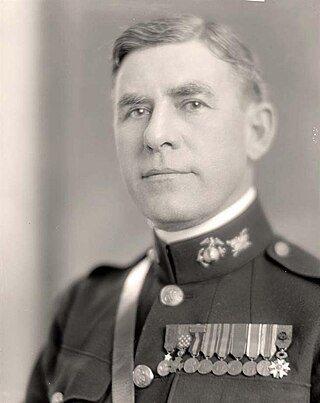Newt Hamill Hall | |
|---|---|
| Born | 2 January 1873 Marshall, Texas, US |
| Died | 24 May 1939 San Diego, California, US |
| Place of burial | |
| Allegiance | United States of America |
| Service/ | United States Marine Corps |
| Years of service | 1895 - 1929 |
| Rank | Colonel |
| Battles/wars | Boxer Rebellion |
| Awards | Marine Corps Brevet Medal |
Newt Hamill Hall (Marshall, Texas, January 2, 1873 - San Diego, California, May 24, 1939) was an American officer serving in the United States Marine Corps during the Boxer Rebellion who was one of 23 Marine Corps officers approved to receive the Marine Corps Brevet Medal for bravery. He graduated from the US Naval Academy in 1895, and was commissioned in the Marine Corps in 1897.
He was brought up on charges regarding his leadership activities during the Boxer Rebellion, where he and his men had to defend the walls of the Legation, and was exonerated by an official naval court of inquiry, which he himself requested, so as to not impede his career advancement in later years.
The British Minister had initiated a charge of possible "cowardice under fire," but no concrete evidence had surfaced by any witnesses. Under his direct command, one Legation wall defense area was lost, but later retaken. This possibly caused a reaction from the British Minister making statements after the siege as to Hall's possible laxity in command.
Citation

Wendell Cushing Neville was a major general of the Marine Corps as well as a Medal of Honor recipient and the 14th Commandant of the Marine Corps between 1929 and 1930.
The Marine Corps Brevet Medal, also known as the Brevet Medal, was a military decoration of the United States Marine Corps; it was created in 1921 as a result of Marine Corps Order Number 26. The decoration was a one-time issuance and retroactively recognized living Marine Corps officers who had received a brevet rank. The similar practice of frocking continues in all six branches of the U.S. Armed Forces.

General Sir Lewis Stratford Tollemache Halliday, was an English Royal Marine officer and a recipient of the Victoria Cross, the highest award for gallantry in the face of the enemy that can be awarded to British and Commonwealth forces.

Daniel Joseph Daly was a United States Marine and one of nineteen U.S. servicemen to have been awarded the Medal of Honor twice. He earned his first Medal of Honor during the Boxer Rebellion in 1900, and the second in Haiti in 1915. Daly and Major General Smedley Butler are the only Marines who earned two Medals of Honor in two separate actions.

Littleton Tazewell "Tony" Waller was a career officer in the United States Marine Corps, who served in the Spanish–American War, the Caribbean and Asia. He was court-martialed and acquitted for his actions during the Philippine–American War, when he led an ill-fated expedition across the island of Samar. Waller retired from the Marines holding the rank of major general.

The Eight-Nation Alliance was a multinational military coalition that invaded northern China in 1900 during the Boxer Rebellion, with the stated aim of relieving the foreign legations in Beijing, which was being besieged by the popular Boxer militiamen, who were determined to remove foreign imperialism in China. The allied forces consisted of about 45,000 troops from the eight nations of Germany, Japan, Russia, Britain, France, the United States, Italy, and Austria-Hungary. Neither the Chinese nor the quasi-concerted foreign allies issued a formal declaration of war.

Major General David Dixon Porter, a Medal of Honor recipient, was a United States Marine Corps officer who served in the Philippine–American War and in World War I.

Sergeant Alexander Joseph Foley was a member of the United States Marine Corps who was awarded the United States' highest military decoration, the Medal of Honor, for having distinguished himself during the Boxer Rebellion.
Private France Silva was the first United States Marine of Mexican-American and Hispanic heritage to receive the Medal of Honor. He received the Medal of Honor for his meritorious conduct in China during the Boxer Rebellion.

John Twiggs Myers was a United States Marine Corps general who was most famous for his service as the American Legation Guard in Peking during the Boxer Rebellion.
Philip Michael Bannon was a United States Marine Corps officer who received the Marine Corps Brevet Medal for his actions during the Spanish–American War.

James Forney was an American officer serving in the United States Marine Corps during the American Civil War. He was approved to receive the Marine Corps Brevet Medal for bravery but died before it could be presented.
Carl Gamborg-Andresen was a Norwegian-born American military officer serving in the United States Marine Corps during the Boxer Rebellion who was one of 23 Marine Corps officers approved to receive the Marine Corps Brevet Medal for bravery.

William Glasgow Powell was an American officer born in at St. Louis, Missouri and serving in the United States Marine Corps during the Spanish–American War who was one of 23 Marine Corps officers approved to receive the Marine Corps Brevet Medal for bravery.

George Richards was an American officer born at Ironton, Ohio, and serving in the United States Marine Corps during the Boxer Rebellion. He was one of 23 Marine Corps officers approved to receive the Marine Corps Brevet Medal for bravery.
Melville James Shaw was an American officer born in Minnesota and serving in the United States Marine Corps during the Spanish–American War who was one of only 23 Marine Corps officers approved to receive the Marine Corps Brevet Medal for bravery.

William Seach was an American sailor serving in the United States Navy during the Boxer Rebellion who received the Medal of Honor for bravery.

Oscar Jefferson Upham was a private serving in the United States Marine Corps during the Boxer Rebellion who received the Medal of Honor for bravery.

The siege of the International Legations occurred in 1900 in Peking, the capital of the Qing Empire, during the Boxer Rebellion and led to the deaths of approximately 2500 Chinese people by western soldiers. Threatened by the Boxers—an anti-Christian, anti-foreign peasant movement—900 soldiers, sailors, marines, and civilians, largely from Europe, Japan, and the United States, and about 2,800 Chinese Christians took refuge in the Peking Legation Quarter. The Qing government took the side of the Boxers after the Eight-Nation Alliance invaded Tianjin at the Battle of the Taku Forts (1900), without a formal declaration of war. The foreigners and Chinese Christians in the Legation Quarter survived a 55-day siege by the Qing Army and Boxers. The siege was broken by an international military force, which marched from the coast of China, defeated the Qing Army, and occupied Peking.
General
Specific